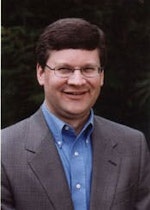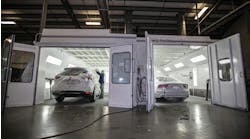One of the key benefits of belonging to an association, attending industry events, stopping by other shops when you’re traveling and even keeping your eyes open when visiting businesses outside the collision repair industry is the chance to get some fresh ideas to try in your shop.
Here are some ideas that might be just the solution you’re looking for to address a problem in your business.
Focusing on the “local” pays rewards
Alex Carney remembers years ago being asked by another shop owner at a meeting how she and her husband Dave market their shop, Tualatin Auto Body in Tualatin, Ore.; she responded by talking about the numerous high school and community sports teams the shop sponsors.
“And he actually laughed at that,” said Carney, a former insurance agent until she and Dave opened a shop in 1986. “But not five years later, they were all marketing that way. Because it works. There’s a loyalty there.”
The walls of the customer waiting room at Carney’s shop are covered with posters and photos of the many teams the shop has sponsored over the years.
“The kids, as they get older, come in and point to themselves or people they know, or talk about coaches they remember,” Carney said.
It would be hard to argue that the shop’s marketing efforts haven’t paid off. From its start with a single employee in a small rented shop, Tualatin Auto Body has grown into a 40,000-square-foot shop with 35 employees.
The Carneys also are very much involved in their community. Dave Carney belongs to the Tualatin Rotary, and Alex Carney belongs to six Chambers of Commerce in the communities surrounding the shop.
"I feel good knowing that because of our involvement, because we truly care for our customers and do a lot of things for them that we don't get paid for to make the job right, that if we weren't here, they would miss us," Carney said. "They are comfortable calling us for recommendations about mechanics, tires, insurance companies."
Steve Dillenbeck also believes that part of how Airport Auto Body, his 11-employee shop near Denver, Colo., can continue to compete against larger players in the collision repair industry is by focusing locally.
The shop participates in some direct repair programs, for example, but also markets directly to local insurance agents. It plays up the reputation it has built based on 18 years of serving the area. And it looks for opportunities to help the community, such as the vehicle-rescue training offered at the shop for firefighters.
“State Farm Insurance donated a couple of cars, and we had firefighters from two different stations here,” Dillenbeck said. “They came into our back lot and just tore those cars apart.”
The shop also works to boost repeat business and referrals by sending every customer a thank-you card with a lottery ticket.
“They have a chance to win the cost of repairs, basically,” Dillenbeck said. “That’s worked out really well for us. We’ve been doing that for years. It definitely helps with customer retention.”
Jim Brown of Madras Body & Glass also is convinced that in a small town such as his (Madras, Ore., population 6,000), community involvement is the best marketing.
"I paint baseball helmets for one of the Little League teams, for example," Brown said. "When one of the kids reaches a milestone, the coach brings me a helmet and we custom paint it for them."
Car-related giveaway
Sometimes a great idea you get at an industry conference has nothing to do with the content of the event. Shops are often looking for custom-imprinted items to give customers or referral sources to help keep the shop name in from of them. It’s all the better when the item is automotive-related.
I-CAR gave just one such item to those attending its annual conference this past summer: An imprinted USB car power adapter. Your customers can plug it into their car’s cigarette lighter or power port and use a USB cable to charge their phone or other device. A quick search online found these gadgets available, imprinted, for as little as $1 each.
Create some cross-town rivalry
Find a similar-sized shop in a different but nearby market whose owner is willing to engage in a friendly competition on a monthly basis. Compete for gross sales per square foot, gross profit, customer satisfaction indexing (CSI) or whatever measurements you’d like to focus on. Employees between the two shops can compete for labor efficiency. The “winning” shop each month gets something supplied by the other shop – lunch, gift certificates, etc.
Take a team approach
European Motor Car Works near Los Angeles, is a bit of an atypical shop, a 12,000-square-foot facility often filled with Aston Martins, Rolls Royces, Shelby Cobras, Jaguars and Mercedes-Benz Gullwings. And owner Kye Yeung also takes a less common approach to compensating employees, using a team concept within the shop rather than flat rate or commission pay plan to help ensure the quality he’s after.
“One of the biggest things that I really want to offer my customers is a consistent repair, and how do you do that if you have a different technician with different skill levels working on their car each time?” Yeung asks. “Even after one bad meal out of 10 at a restaurant, you’re more hesitant to refer someone because they could get that same bad meal. So one of the things I thought would alleviate that problem would be to create this team system, where everybody here touches each car. Each car comes in and at each stage gets worked on by someone who specializes in what they do. It moves through this assembly line, so it’s the same team fixing every car, not different individuals.”
Interest in consistent quality also led Gary Wano to shift his technicians at G.W. and Son Auto Body in Oklahoma City, Okla., from flat-rate pay to hourly.
“No matter what we put into place about quality being ‘Job No. 1,’ when it comes down to
payroll time, if a tech doesn’t have quite enough hours, you’d be surprised how creative they can become when it comes to getting a car completed,” Wano said. “We didn’t have anything major go wrong, but I got to wondering how many little things were going out (undone) just because of payroll.”
Wano said at the time of the change, he was operating two teams within his shops, and he explained the change he was thinking about to the two team leaders, building the system around their input. They were naturally concerned about technicians earning less than they had, Wano said, so he took each employee’s average income over the previous 30-month period and converted that to an hourly wage.
To further encourage teamwork, Wano instituted a bonus system – for technicians and office staff – based on completed sales dollars each month. With employees more willing to work together, the shop is handling more production with the same number of people as it did under the previous pay plan, Wano said.
Look for ideas outside the shop
Sharp shop owners don’t restrict themselves to looking for ideas from other shop owners. Often there are great ideas being used in other industries that could work just as well for shops.
A big part of sales is making a connection with the potential customer. One bank looking to develop rapport between its staff and customers placed a small sign on each employee's desk that highlights four off-beat facts about that employee. It might list hobbies they enjoy on the weekend, something interesting they’ve done in their past, a favorite film or music genre, a non-profit group they support, etc. A bank branch manager said the signs stimulate conversations and connections.
Another idea being used in other industries: pay-it-forward day. Give each employee a small amount of cash ($5 or $10) with which to do a good deed for someone. When they do an act of kindness (paying for a cup of coffee, paying a toll, etc.), they can hand the recipient a card that reads, "The employees of (company name) are paying-it-forward and invite you to do a good deed for someone else. It can be as big or small a deed as you wish. We hope your day is a little brighter. And feel free to let us know what you did on our Facebook page."
Your employees can post what they did on your shop’s Facebook page (and their own), and the recipients of their generosity might do so as well.
Find new ways to motivate
Mike Young of Atomic Auto Body in Richland, Wash., knew that his shop’s paint materials costs were generally about 6 percent to 6.2 percent of his total sales. So this year he told his five-technician paint crew that any month that they could keep paint materials to just 5 percent of sales, he’d split the difference with them.
“They hit 5 percent each of the first three months,” Young said. “That threw another $1,300 into their bonus pool.”
The monthly number has sometimes inched back up to 6 percent, he said, but overall the plan has paid off.
“I’m making a higher profit on paint this year than I did last year just because they’re being more careful with how they’re mixing and spraying,” Young said.
Use a paperwork expiration date
Aside from the paper associated with repairing cars and running a business, it’s easy to develop stacks of paper you’re sure you’ll need or want to use someday. This may include notes or handouts from seminars, articles clipped from trade publications, proposals or marketing materials from vendors, etc.
It can be difficult to come up with a system to sort and file this type of paperwork, so it often sits in unsorted piles gathering dust. First, try filing it into broad headings as future purchases, marketing ideas, repair information, regulatory compliance information, etc.
Second, whether or not it gets filed or piled, use a bold marker to put the date on each item as you receive it or choose to save it. This will give you at least a rudimentary way in which to organize it, and it may help you find it if you have some idea of where it’s likely to be chronologically in the “collection.”
The date is also important because if you come across a dated item that’s more than a year old, you’ll know it’s probably time to toss it; if you haven’t needed it during the past year, you probably never will.
You may not choose to dispose of everything after exactly a year , but knowing how long that paper has sat without being looked at may make parting with it a little easier.
Check in with your customers
Industry consultant (and ABRN columnist) Mike Anderson told those gathered at an Automotive Service Association of Arizona meeting this past summer about an idea he’d picked up from Latuff Brothers, a fourth-generation collision repair business in St. Paul, Minn. The shop held a consumer focus group, bringing in more than a dozen of its recent customers to ask them about their experience with the shop. Anderson said the customers were asked what the shop did that the customers liked or didn’t like, and what the shop didn’t do but the customers would’ve liked.
Anderson said one of the things that came as a surprise to him was that customers didn’t like that when they brought in their car, the shop went around and identified all the pre-existing unrelated damage.
“When you marked all the old damage, I felt like you were saying my car was a piece of junk,” Anderson said one customer told the shop.
“When I owned shops, I was the king of old damage,” Anderson said. “I marked everything because I didn’t want to be blamed for that. But I learned the customer can be offended by that.”


(1).jpg?auto=format,compress&fit=max&q=45&w=250&width=250)





